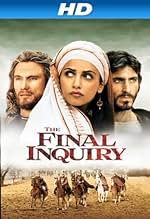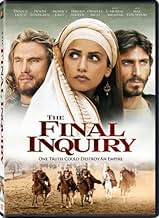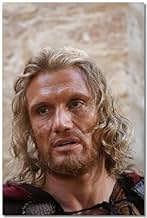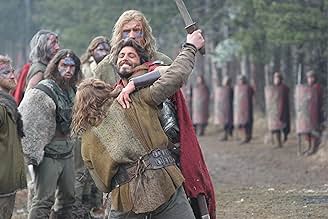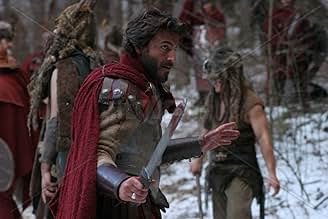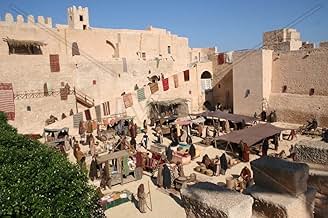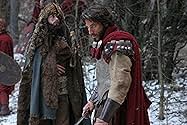IMDb RATING
5.3/10
1.5K
YOUR RATING
In 35 A.D., a Roman tribune is sent to Palestine to investigate the death and possible resurrection of a certain Jesus from Nasareth.In 35 A.D., a Roman tribune is sent to Palestine to investigate the death and possible resurrection of a certain Jesus from Nasareth.In 35 A.D., a Roman tribune is sent to Palestine to investigate the death and possible resurrection of a certain Jesus from Nasareth.
- Awards
- 2 wins total
Featured reviews
The original movie, made in 1986 and starring Keith Carradine and Harvey Keitel, is a little-known gem of an intellectual thriller, with a plot that takes numerous unexpected twists.
This "remake" (hardly that, since the title, basic premise, and name of the lead character are all that remain) is essentially a Sunday school movie made by hacks, full of pious posturing. It's pretty to look at, but utterly lacking in suspense, narrative drive, good acting, or just about anything else you might desire in a movie.
I am beginning to think that any movie with Valerio Massimo Manfredi's name in the credits is going to be very, very bad.
This "remake" (hardly that, since the title, basic premise, and name of the lead character are all that remain) is essentially a Sunday school movie made by hacks, full of pious posturing. It's pretty to look at, but utterly lacking in suspense, narrative drive, good acting, or just about anything else you might desire in a movie.
I am beginning to think that any movie with Valerio Massimo Manfredi's name in the credits is going to be very, very bad.
I want to comment on what someone already said.
The comment was upset at treatment of Jewish practice portrayed in the film. However, the rules on adultery and trials, well ... if you want to be upset, be upset at the gospels.
The gospels portrayed the trial as a crooked rush job. Likewise, the stoning for adultery (and in the past, rural areas did not always strictly follow the dictates of the law) was referenced in a favorite scene in the Bible as well. The Bible had no "backstory" underlining that really the stoning in practice was a last result and rarely done practice. We were meant to see it as barbaric, the crowd driven more by passion than reason (before Jesus came around to guilt them).
In fact, some gospels had various scenes that put Jewish practice in bad light. At times unfairly. For instance, the money-changing in the temple -- you needed that to allow people from all over to have the right sort of coin to give their offering. It surely had some bad flavor, but it was not just about a "band of thieves." Lashing out like Jesus did kinda suggests why some thought the guy a tad bit dangerous especially in an age of rebels and revolts.
If one wants a "historical" reflection of what "actually" happened, which honestly would be not a bad way to go, they wouldn't be as reliant on scripture and all. The conceit of this movie also would not really be possible, to be totally honest about it.
The comment was upset at treatment of Jewish practice portrayed in the film. However, the rules on adultery and trials, well ... if you want to be upset, be upset at the gospels.
The gospels portrayed the trial as a crooked rush job. Likewise, the stoning for adultery (and in the past, rural areas did not always strictly follow the dictates of the law) was referenced in a favorite scene in the Bible as well. The Bible had no "backstory" underlining that really the stoning in practice was a last result and rarely done practice. We were meant to see it as barbaric, the crowd driven more by passion than reason (before Jesus came around to guilt them).
In fact, some gospels had various scenes that put Jewish practice in bad light. At times unfairly. For instance, the money-changing in the temple -- you needed that to allow people from all over to have the right sort of coin to give their offering. It surely had some bad flavor, but it was not just about a "band of thieves." Lashing out like Jesus did kinda suggests why some thought the guy a tad bit dangerous especially in an age of rebels and revolts.
If one wants a "historical" reflection of what "actually" happened, which honestly would be not a bad way to go, they wouldn't be as reliant on scripture and all. The conceit of this movie also would not really be possible, to be totally honest about it.
I saw the brilliant original by Damiano Damiani (http://www.imdb.com/title/tt0093255/) about twenty years ago. This is not a remake. Compared to the original screenplay, the story in this film is a joke in the best tradition of Hollywood, and it utterly does not follow the original plot.
This is a propaganda movie, a failed copy of the masterpiece by Damiano Damiani and a poor attempt to substitute real world values by thin air speculation and candy, pure Hollywood style. Nevertheless the movie has a value of its own, I have never seen Dolf Lundgren in a role like the one he took in this movie, and I could say that Monica Cruz play is not worse than her sister's, not to mention that Monica is somehow prettier than Penelope. It is a shame that Ornella Mutti did not participate in the original by her compatriot Damiano Damiani.
This is a propaganda movie, a failed copy of the masterpiece by Damiano Damiani and a poor attempt to substitute real world values by thin air speculation and candy, pure Hollywood style. Nevertheless the movie has a value of its own, I have never seen Dolf Lundgren in a role like the one he took in this movie, and I could say that Monica Cruz play is not worse than her sister's, not to mention that Monica is somehow prettier than Penelope. It is a shame that Ornella Mutti did not participate in the original by her compatriot Damiano Damiani.
First, I was unaware that this was a re-make. If the first movie is on DVD, I'll try it to see any difference. As to this movie (2006), I am going to write my usual bug-aboo about historical accuracy and the movies.
I wish just once that a film set in the period of Yeshua/Jesus would depict the Jewish people with a less than jaundiced - read: historically inaccurate - eye. I was confronted at the very opening of this film with yet another scene of "crazed Jews" stoning a woman for adultery. According to some extensive research on this period, I have learned that the imposition of the death penalty in ancient Jewish society was rare and could only be undertaken under very controlled conditions. For example, a woman caught in adultery was not automatically put to death. Both she and her husband had to appear before the Great Sanhedrin in Jerusalem - and only this body, with the consent of every single member, could actually pronounce the death sentence. One "no" vote and there was an acquittal. The husband could forgive his wife and take her back and that was the end of it. Or he could divorce her. If she was freed and committed adultery again, then the matter would be returned to the High Court. Trials took three days: testimony and evidence on the first day; deliberation by the court on the second, and the third day reserved for the verdict. This third day was meant as a "cooling off period" to avoid a rush to judgment. The sentence upon conviction was not always death. None of this "crazed outrage" in the streets followed by an angry stoning as depicted in this film. It is also said that any Sanhedrin that passed two death sentences within 7 years was called a "bloody Sanhedrin." In other words, the Jewish people had made a deliberate attempt to provide justice in an orderly and civilized way. To depict them as simply a bunch of "crazies" running about the streets like blood-crazed savages is nothing more than pure propaganda.
One other note on the trial, each member of the court had a small pebble - a stone - that they tossed (cast) into a large pot. The stones were then counted to reach a verdict. This is what is meant by the phrase: "Let those among you who are blameless (without malice; pure of heart) cast the first stone."
Further, no Sanhedrin would meet to hold a "trial" - especially one involving a potential death sentence - within three days BEFORE and three days AFTER a religious holiday. This is because of the three-day trial concept. Therefore, Jesus couldn't be tried and convicted on the same day.
As far as this movie is concerned, it is a standard Christian story told with some reverence for the faith, although it is not entirely original in it's story line. Compare it with "The Robe" (1953) where a Roman soldier (Richard Burton) is sent by the Emperor Tiberias to find the "true" story of what happened in Jerusalem. That Roman is cynical at first but, through the miracle of Peter saving a young woman (played then by Debra Paget), the soldier converts to Christianity.
I wish just once that a film set in the period of Yeshua/Jesus would depict the Jewish people with a less than jaundiced - read: historically inaccurate - eye. I was confronted at the very opening of this film with yet another scene of "crazed Jews" stoning a woman for adultery. According to some extensive research on this period, I have learned that the imposition of the death penalty in ancient Jewish society was rare and could only be undertaken under very controlled conditions. For example, a woman caught in adultery was not automatically put to death. Both she and her husband had to appear before the Great Sanhedrin in Jerusalem - and only this body, with the consent of every single member, could actually pronounce the death sentence. One "no" vote and there was an acquittal. The husband could forgive his wife and take her back and that was the end of it. Or he could divorce her. If she was freed and committed adultery again, then the matter would be returned to the High Court. Trials took three days: testimony and evidence on the first day; deliberation by the court on the second, and the third day reserved for the verdict. This third day was meant as a "cooling off period" to avoid a rush to judgment. The sentence upon conviction was not always death. None of this "crazed outrage" in the streets followed by an angry stoning as depicted in this film. It is also said that any Sanhedrin that passed two death sentences within 7 years was called a "bloody Sanhedrin." In other words, the Jewish people had made a deliberate attempt to provide justice in an orderly and civilized way. To depict them as simply a bunch of "crazies" running about the streets like blood-crazed savages is nothing more than pure propaganda.
One other note on the trial, each member of the court had a small pebble - a stone - that they tossed (cast) into a large pot. The stones were then counted to reach a verdict. This is what is meant by the phrase: "Let those among you who are blameless (without malice; pure of heart) cast the first stone."
Further, no Sanhedrin would meet to hold a "trial" - especially one involving a potential death sentence - within three days BEFORE and three days AFTER a religious holiday. This is because of the three-day trial concept. Therefore, Jesus couldn't be tried and convicted on the same day.
As far as this movie is concerned, it is a standard Christian story told with some reverence for the faith, although it is not entirely original in it's story line. Compare it with "The Robe" (1953) where a Roman soldier (Richard Burton) is sent by the Emperor Tiberias to find the "true" story of what happened in Jerusalem. That Roman is cynical at first but, through the miracle of Peter saving a young woman (played then by Debra Paget), the soldier converts to Christianity.
a Biblical film. not great ambitions, few nice fight scene, basic line, a cast with exercise in this type of drama ( Hristo Shopov - new / old Pontius Pilat, Hristo Jivkov - ex - John in Passion of Crist, now Stefan ), Dolph Lundgren in skin of different kind of role, Max van Sydow, Enrico Lo Verso , F. Murray Abraham as solid pillars , Ornela Mutti like drop of scent and beautiful Monica Cruz - alter -ego of her sister and basic attraction of a movie who is not Quo Vadis, not Jesus of Nazareth but little exercise to recreate atmosphere of Church beginnings. so, it is just an exercise. not spectacular, not interesting, almost boring and predictable but decent at first sigh. crumbs of history - legend about Tiberius death -, pieces of innovation - the decree about Chistianity freedom -, authentic miracle of come back to life of Tabitha and the end - mixture of dust and faith. a drawing like so many others.
Did you know
- TriviaWas conceived as both a theatrical film and a TV movie.
- GoofsIn the early scene in which Tito Valerio Tauro leaves Tiberius on the isle of Capri, the film is being run backwards because the fire and smoke on the upper right of the scene is going into the fire, not up and away from it .
- Alternate versionsThere are two versions of the film, a theatrical one (112') and a TV one in two parts (190' - 95' each). The extended version premiered on Italian and is available on the Czech DVD edition. The TV version is highly recommended due to its complete script with a larger cast of relevant characters, which increases plot weight and eases the story understanding. Apart of some characters, a few secondary outlines appear despite of the cinema version. Sometimes, the short version seems to be cut off, but some viewer's questions may be shown are fully solved in the most amusing TV version.
- ConnectionsFeatured in Making of 'The Inquiry' (2007)
- How long is The Final Inquiry?Powered by Alexa
Details
- Release date
- Countries of origin
- Official site
- Languages
- Also known as
- The Final Inquiry
- Filming locations
- Bulgaria(opening)
- Production companies
- See more company credits at IMDbPro
Box office
- Budget
- €8,000,000 (estimated)
- Gross worldwide
- $249,610
- Runtime
- 1h 52m(112 min)
- Color
- Sound mix
- Aspect ratio
- 1.85 : 1
Contribute to this page
Suggest an edit or add missing content


